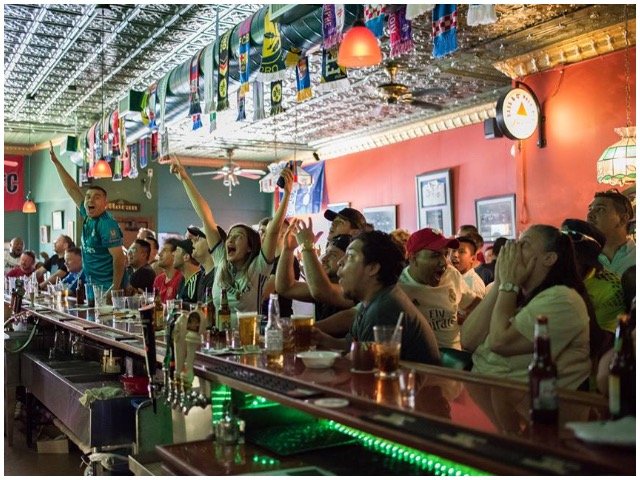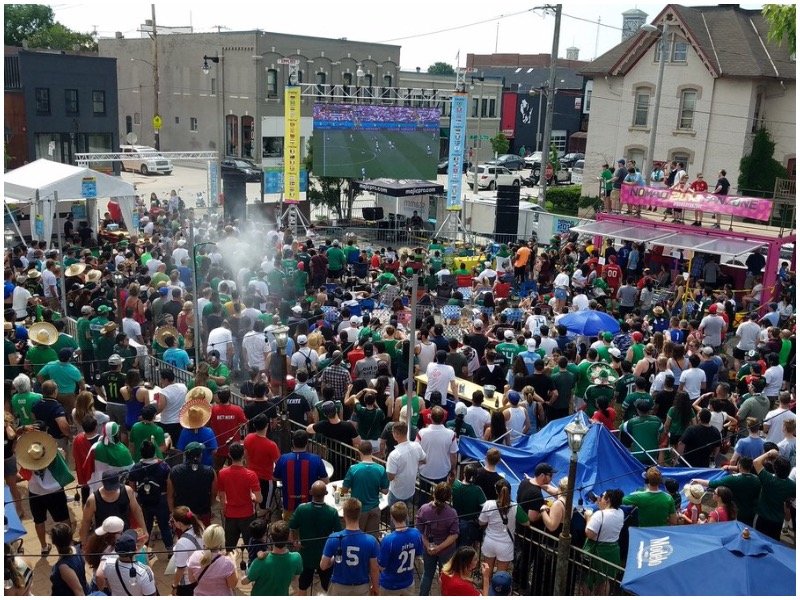I was born and raised in Florence, Italy, where it is almost abnormal not to follow football, or for fellow Italians, "calcio" - and what is commonly called "soccer" in the United States. Even if not intentionally, Italians know what's going on with one's city's team, or the winner of Coppa Italia or some local players, etc.
Football is so saturated in Italian culture that I didn't realize just how much it defined the country's identity until I moved to the States. The ideal of the "American melting pot" has always presented itself mysteriously as the defining characteristic -- the romantic myth that distinguishes this from any other country. This concept remained intangible until recently.
I moved to Milwaukee late in the summer of 2008, and while walking down Kinnickinnick Avenue -- still in the sweaty process of moving into my new home -- I saw the Highbury Pub and did a double take. I could not quite believe that a football bar-a soccer bar to some-was literally around the corner. The very existence of such an establishment pleasantly shocked me, as in my experience most Americans do not display any particular affinity for my native sport. I began to spend quite a bit of time at the pub tracking Italia's Serie A and other European leagues, which usually meant daytime hours, as they were being televised live from Europe. In my myriad visits it was impossible to ignore the diversity of people the pub attracted -- people of all ages, all interests, all nationalities, all sharing the same passion.
In Florence, you will witness the love for the home team Fiorentina from the smallest to most radical of ways -- a fleur de lis sticker on numerous cars (that flower is the city's icon), to purple flags hanging from balconies (purple being the color of the team's jerseys), to manifold placards of the team's ever adored coach Cesare Prandelli lining the main roads of the city's light-posts. It's not just that you see purple, it's that you see nothing else. It is the most monogamous relationship in the country, an absolute monopoly. Football has even changed the way Sundays are experienced in the Catholic capitol of the world -- church is important, but the afternoon match surpasses the sacred. Calcio was always a natural presence in my life, a family member at the dinner table. As I grew older-and I grew accustomed to the States after my move to the nation's Midwest at the age of 16, Fiorentina gradually carved its way into my heart and football as a whole has become ritual for me.
To satisfy this habitual fulcrum in my life, the Highbury became a point of reference, a place to reconvene and unwind. The Highbury Pub took its name from the stadium which served as home for Arsenal in England from 1913 to 2006. Much like the Highbury in London, the local pub in Bay View serves as a home for football fans here. I realized, over time, that very particular and admirable uniqueness belonged to this tavern. Every weekend (and even during the week), first as a patron and now as a bartender, I get to experience a ragtag collection of internationals cheering on their respective teams from all corners of the globe. Spend a few hours, if not a few minutes at the bar, and you will feel like you walked into the United Nations' lunchroom. You will hear different languages being spoken -- Spanish, Polish, Italian, Serbian, German, French, and more -- you will hear people exchanging stories from their own cultural backgrounds, and you will most likely be watching two to five matches at once on multiple screens, and you will be viewing games from all different national leagues.
Highbury patrons encompass the gamut -- you will find lawyers, aldermen, nurses, teachers, mailmen, writers, etc. What could easily become a natural breeding ground for arguments and disputes is instead a fun and comfortable hub of cultural exchange, endemic to Milwaukee's immigrant history. There are no hooliganism or bar fights, when a match is over, groups of opposing fans mingle and resume conversation. Some individuals come to watch the avid supporters of various clubs-often arriving at six or seven in the morning to watch their teams play, cheering on Manchester United, Chelsea, Liverpool or Arsenal with the most creative, uproarious songs and ditties. The ingenuity of the chants is uncanny -- there is a song for every player, every move on the pitch, tunes for players that are either loved or despised, lines about cheating -- it's quite an impressive performance, and it is telling of just how passionate some Americans are about soccer.
The fascinating coagulation of individuals led me to reflect on football itself in its attractive and alluring features. The mere fact that this bar is able to attract such a wide range of individuals is telling of the power of this sport. What makes football so distinct is its beautiful simplicity 00 all you need to play it is a ball, and the rules are few and simple. It does not discriminate against any type of person, as virtually anyone can play, as long as you are athletic and willing to run. Moreover, and counterintuitive to American capitalism, a match will never stop for commercials, and it is a set length of 90 minutes. You have to focus on the fluidity of the game. Colloquially, if American sports are the symbolic equivalent of lining up shots at the bar; European football, the "beautiful game," is a delicate fine wine -- savored for each sip.
Having been employed at the Highbury for the last eight months, I have had not only the privilege to watch "the beautiful game" during work hours, but I have also had the time to observe, from an objective view, what football does to people-how it transforms them, unites them, and what it means to them on a personal, intimate level. Their pupils focus on the ball's movement, but the whole of their eyes follow the dance of the players as they make their way across the pitch like a paintbrush dances across a fresh layer of canvas. The word "sport" does not do football justice and becomes nearly restrictive-its simplicity and artistic quality add a sense of elegance that contradict the idea of other mainstream sports.
Football is a wonderful teacher when it comes to cultural inquiry. Geography, history and values make themselves manifest on the turf. With the World Cup tournament beginning on June 11th-the numbingly important match between England and the United States being played on June 12th-we will witness a myriad of nations display their personalities in their style of play. We will see countries come to a temporary peace-a midday truce-to follow the elegant flight of a long cross into the box. Our potentials and vulnerabilities will dance together for ninety minutes only pausing until the next match. At the moment, the Highbury is preparing for this month-long odyssey. And after a month's time, the cup holders will cherish each day for the next four years until the 2014 host country, Brazil, opens its arm to 32 nations. If you are just a wee bit curious, I suggest you pop your head into the pub from June 11th to July 11th, as you will get sense of the passion and the camaraderie of the world's most cherished sport-and see with clarity just how football can bridge our differences and heal our wounds.
It is this way that I have seen the American melting pot breaks its idealistic sphere and make itself evident, pragmatic, and alive. The Highbury Pub's intense focus on this sport sheds light on the idiosyncratic qualities of football that go far beyond kicking a ball into a net. There is something powerful about a sport that traverses the boundaries of cultural and racial identity, and transforms the masses into one -- unifying otherness into a universal language that everyone can speak and that all can and want to hear.
Forza Italia!
She received a BA from Beloit College, where she developed as a modern dance choreographer. She has worked in the arts administration world in Chicago and has interned at The Repertory Theater in Milwaukee.
The performing arts -- film, theater and music -- are her passion, and she believes that the stage is not limited to scripted, but rather expands even the length of the soccer field.
She works part-time at the Highbury Pub in Bay View, which inspires her to share her cross-cultural experiences and her ideas on "the beautiful game."







